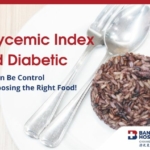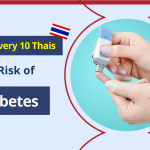Diabetes is on the rise in Thailand, with almost one in every ten Thais aged 15 and above suffering from the disease, amounting to nearly 5 million people. Diabetes is difficult to live with it since dieting, taking medication, and frequent medical visits are required to keep blood sugar levels within the normal range, as blood sugar levels that are too high or low pose a risk to one's life and are highly expensive. Let's learn more about the causes of diabetes and how to prevent complications.

Diabetes causes are anomalies in the body that prevent it from using sugar as an energy source as it should, resulting in high blood sugar levels. However, the major sources of patient risk are diabetic complications such as cardiovascular disease, renal disease, and nervous system disease, as well as hypertension, including peripheral vascular disease, which can lead to physical impairment or death. There are two types of diabetic treatments: those that regulate our blood sugar to avoid and reduce problems, and those that do not.

Acute Diabetic Complications
It is a symptom of hypoglycemia that affects the body system, such as diabetic patients with hypoglycemia, which causes dizziness, seizures, or unconscious phases leading to death.
In diabetic individuals with hyperglycemia, this symptom might progress to acidosis, coma, or harm to other organ systems.
Chronic Diabetic Complications
Long-term hyperglycemia causes blood vessel walls throughout the body to be damaged, deteriorated, and stiffened, resulting in blockages and problems in small and large blood vessels, for example:
Small Blood Vessels Complications
Retinal complications can cause blurry vision and shadowing, which is a sign of a variety of eye diseases such as cataracts, glaucoma, diabetic retinopathy, and macular degeneration, and it can also cause the retina to tear, fracture, lose sight, or even blindness.
Kidney complications induced by higher-than-normal hyperglycemia resulted in alterations in blood flow to the kidneys, leading protein to leak in the urine. This reduces renal function, resulting in congestion, diabetic kidney, edema, and swollen legs and arms. Dialysis is the primary therapy, and kidney replacement may be required to prevent acute renal damage.
Nerve complications will lead to numbness in the tip of the hand or toe, like being stabbed, with burning pain, or losing most of the sensation, occurring during the night. Caused by the spread of peripheral neuropathy that weakens the senses and may cause weakness in the muscles of the arms and legs.
Large Blood Vessels Complications
Coronary artery disease and heart attack are caused by the narrowing of large blood vessels that leads to stroke, and also by abnormal blood vessels, high blood pressure, and abnormal levels of blood fats, resulting in peripheral arterial disease, especially on the legs or a wound on the tip of the foot causing infection, as the lack of proper treatment. If it is not treated in time, it may lead to serious losses.
Diabetes Complications Treatment
Maintain a cholesterol level of no more than 100 mg/deciliter.
Blood pressure should not be higher than 130/80 mmHg.
Maintain a blood sugar level of 80-130 mg/ deciliter.
6.5-7.5 percent HbA1C (Hemoglobin A1C) control
In any case, it depends on the patient's risk and other conditions that require testing and diagnosis.
How do you take care of yourself and diabetic patients?
When diabetes patients are unable to manage their blood sugar levels, there is a danger of fluid loss through frequent urination, thus drinking water helps to balance the body.
Relieve stress and anxiety because they raise blood sugar levels.

Food management is limiting the intake of sweets and wheat while increasing the intake of vegetables, fruits, whole grains, protein, lean meats, and so on. Avoid trans-fat meals and unsaturated fatty acids such as margarine, nondairy creamer, sweetened condensed milk, etc., as well as liquids such as tea or coffee, and avoid smoking and drinking alcohol.
Maintaining a healthy weight in order to lower triglycerides, cholesterol, and blood sugar levels.
Check-ups, blood tests, blood pressure, blood sugar, and cholesterol levels should all be done on a regular basis. Furthermore, beginning research on diabetes patient self-care will help with evaluation and health treatment.
It is critical to provide proper diabetes treatment to patients. As previously said, in order to avoid difficulties. Visiting skilled doctors for diabetes complication control is the greatest approach to ensure your safety and wellness.
Internal Medicine Clinic | Bangkok Hospital Chiang Mai










